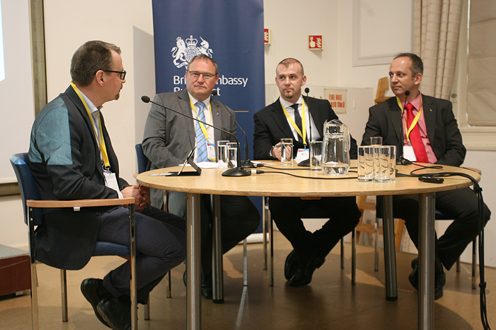On April 22 British Embassy Budapest organized the First Prison Radio Conference, showcasing the work of prison radios and non-governmental organizations operating in Hungarian correctional institutions. At the conference British creators of the first prison radio talked about their achievements in the past ten years, governors of Hungarian institutions talked about their local radios, and representatives of Adj Hangot Association and former prisoner radio hosts also spoke.
Judit Hajdú, Vice President of the Association explained that after the 2014 launch of the first prison radio station in Vác now, since February, a second station is operating in Győr, and a third one is close to launch in Budapest, in the Gyorskocsi Street building. Since the latter building holds both male and female inmates, there will be female voices on the radio, she said. They are planning to involve juvenile prisons in the program, but they also have to work on attitudes towards released prisoners because “without a welcoming community there is no place to return to”.
Tamás Pápai, former Editor in Chief of the first Hungarian prison radio Rács FM spoke about supporting prisoners’ social integration by shaping their mindsets being the most important mission of such a radio station.
Deputy Head of Mission Caitlin Jones called attention to a recent speech by her home country’s Prime Minister David Cameron, in which he called on society to consider former prisoners a resource instead of a burden, and explained that a society with sympathy towards former prisoners helps integration.
Phil Maguire, Chief Executive of the UK’s Prison Radio Association and Director Andrew Wilkie spoke about how, starting from scratch, they created an organization with 16 employees and a cash flow of GBP 700 thousand in the scope of ten years. Their broadcasts, one for male and one for female prisoners, are available 24 hours a day in prisons.
About four fifths of all prisoners listen to the radio daily, some for over ten hours, and weekly they reach nine tenths of all of the 86 thousand prison population. They believe that their main strength is authenticity: it is important that listeners do not consider the radio the voice of the governor or the state, but instead a source of useful and interesting information.
Their broadcasts, which are available at every prison in the United Kingdom, aim at reducing recidivism, which makes their mission an investment with measurable financial benefits. They raise funds by creating authentic content about prisons to other media, for example the BBC.
Hungary has two prison radios, one at Vác Strict and Medium Regime Prison and another at Győr-Moson-Sporton County Remand Prison. A third station is close to launch in the Gyorskocsi Street building of Budapest Remand Prison. The governors of these institutions: Col Károly Kopcsik, Col Attila Mihály, and Brig Gen Zoltán Cséri participated in a roundtable discussion on their initial approaches, selecting prisoners to work for the radio, plans for the future, their own favorite shows and the shows popular with prisoners.
Participants at the conference could listen to the broadcasts; creators brought along compilations of the various radio shows they offer. Each radio station introduced itself, and mentors from the NGOs explained how operations had been set up, how shows are made, and what the most memorable events had been.
Former prisoners and prisoners currently under reintegration arrest who had been active participants in the creation of the shows talked about their experiences and also participated in conference organization – they acted as roundtable moderators, reporters and interviewees.
Are Høidal, Governor of Halden Prison in Norway talked about the Norwegian Prison Service and a prison built in 2010. He talked about the paradigm shift in Norway which transformed corrections officers from guards into mentors, and explained recent changes in legislation targeting the social integration of former prisoners.
Titanilla Fiáth, Psychologist at Budapest Strict and Medium Regime Prison talked about the results of her research into social integration and responsibility in American correctional institutions.
Hungarian NGOs working with prisoners showcased their work at the conference. Tévelygőkért Foundation presented its program “Apa a börtönben” (Dad in prison). Col István Budai, Governor of Balassagyarmat Prison talked about his experiences with the program and a former prisoner explained what kind of assistance he received from the foundation after his release from prison.
Col Attila Juhász, Governor of Heves County Remand Prison talked about the eight-year-old community program Prison for the City, and about the role of storytelling in their therapy program for mothers in prison.
Vác has a program called “Apa küldi” (From Dad) by Hazavárunk Foundation, also aiming at strengthening family ties, which allows prisoners to build and send personalized gifts to their families.
In closing of the conference Sociologist Gábor Héra presented his research into the prison radio in Vác. He found that three quarters of prisoners listen to the broadcast at least once a day, but reruns are also popular.




